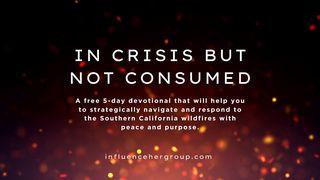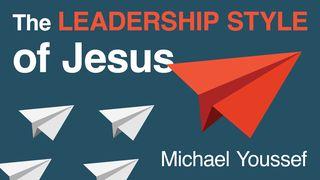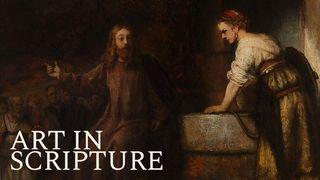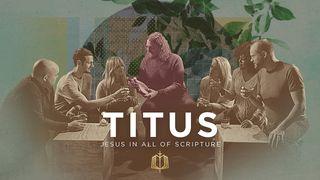The Trinity: An Inherently Relational GodSample

The previous four studies have laid the theological groundwork of the Trinity. We do not follow an unknowable God, and we best understand each Individual within the Trinity when we view and understand each Person in the context of their relationship with One Another.
Before moving on, it’s worth taking the time to reflect on the difference between our modern understanding of individualism, and what it has historically been. This is because, in our current Western world we have a very individualist understanding of what it means to be a person. This type of thought was not really a concept before 1200 AD, and our modern reference point of hyperindividualism is much more recent than that.
But, this was not the case in the ancient world (including in Jesus' time), nor in many places around the world still today. For most of history, what made you a person was defined by your place within a wider community. This is why, for example, we have so many genealogies within the Scriptures, because people were known for being so-and-so’s father, or mother, or daughter, or son, from this clan, or this tribe. Your individual personhood was defined by your relationship within the community around you, which is why things like shame and honor were a much bigger deal and affected way more than just yourself.
This is also true of the Trinity. Although it is very tempting for us to individualize each Person of the Trinity (as we did on day three), it is better for us to keep them as One Whole: understanding them in the context of the Group, as opposed to pulling them apart. This is because the relationship of the Trinity is the bedrock of who God is.
Similarly, our relationships are also central to our lives, and who we are as individuals. It is the people, groups, and culture that surround us that often make up who we are, how we think, and how we function in the world.
There are so many relational foundations we can learn from the Trinity, and apply to our lives: starting with the importance of living in intentional Community.
Most Christians would probably say that they serve one God. However, if this one God was a single Person, then His “Oneness” would really mean sameness. Luckily, our One God is not One Person, and thus Oneness for the Trinity does not mean sameness, but unity. As God the Father is Absolutely One with His Son, and yet is not His Son, so too are we made to be one with others and yet at the same time be totally separate from them.
The Bible has a lot to say about unity with others, for example:
“Just as a body, though one, has many parts, but all its many parts form one body, so it is with Christ. For we were all baptized by one Spirit so as to form one body—whether Jews or Gentiles, slave or free—and we were all given the one Spirit to drink. Even so the body is not made up of one part but of many.” - 1 Corinthians 12: 12-14
“Be completely humble and gentle; be patient, bearing with one another in love. Make every effort to keep the unity of the Spirit through the bond of peace. There is one body and one Spirit, just as you were called to one hope when you were called; one Lord, one faith, one baptism; one God and Father of all, who is over all and through all and in all.” - Ephesians 4:2-6
Way back from the first chapters of the Bible we are called to live in community with others and to strive for unity. We see this in the creation of Eve when God tells Adam it was not good for him to be alone.
Therefore, as our God is and always has been in Community, so too should we be. We are made in the Image of God after all; a Being who is by His very Nature Relational. This means that in many ways we can only fully discover our true identities and purpose whilst in relationship with others, in the context of community. It is how we were designed, and we can not escape it.
Community is the context in which we experience both our limits and our gifts. Therefore, it is only in relationships with others that we can mature and grow. This is why the Christian life is meant to be lived with others, especially as we look out for and serve one another. Solitary Christianity should not be a thing.
Additionally, although the Christian community should be known for its unity, it is also not intended for sameness, but rather its multiplicity (just as within the Trinity!). We read throughout the Scriptures that we are One Body with many parts (1 Corinthians 12: 12-14); we are not all made to be the same but rather it is our diversity and our varied strengths that make us so beautiful in the first place. It is exactly because we are not the same that we need one another and that we are better together. Just like the Trinity, our strength lies in both our unity and our diversity.
It is not enough to simply exist in community, but we must also go one step further and be intentional about living communally: using our gifts to serve and love others. For, just as the Trinity is characterized by each Person mutually giving everything exhaustively away to One Another, so too the Church should seek to reflect this extravagant giving in service of one another and service and outreach to the world.
The Bible makes it clear that we have all been given gifts by the Holy Spirit, and the only and proper expression of them is in the context of community and for the good of other people within and outside of the Church Body.
Finish up today’s study by thinking through or journaling the answers to the following questions:
What does this sentence mean to you and your life? “Community is the context in which we experience both our limits and our gifts”. Do you agree or disagree? How have you experienced this in your own life?
In what ways do you see “solitary Christianity” in our world today? Do you agree or disagree that it shouldn’t exist? Why or why not?
What should unity look like for Christians? How is unity different from sameness?
What do you think your gifts are? How do you express and use them within the context of community?
Spend some time in prayer with God, asking Him about the topic of community, and your place within the Body of Christ. Is there anything you need to do (or stop doing), to make community more of a priority in your life? Or, to make better use of your gifts in the context of loving and serving others?
Scripture
About this Plan

In order to know God, we must understand the Trinity: one God as Three Persons, an inherently Relational Being. This Plan examines the Three Persons of the Trinity. Looking at this Relationship teaches us valuable and applicable life lessons including the importance of intentional community, the Biblical call to reconciliation, the practice of hospitality, and the central importance of prayer and worship.
More
We would like to thank YWAM MEDICAL SHIPS for providing this plan. For more information, please visit: https://ywamships.org/
Related Plans

Lent: The Journey of Letting Go

In Crisis but Not Consumed

The Leadership Style of Jesus

Art in Scripture: The Earth Is the Lord's

Week 2: Knowing Truth in the Age of AI

Titus: Godliness in a Rebellious Culture | Video Devotional

Our God Who Pursues: Guiding Us Back to Him

How Sweet the Sound
![[Know This] Promises of a Precious Faith](/_next/image?url=https%3A%2F%2Fimageproxy.youversionapistaging.com%2Fhttps%3A%2F%2Fs3.amazonaws.com%2Fyvplans-staging%2F55603%2F320x180.jpg&w=640&q=75)
[Know This] Promises of a Precious Faith
